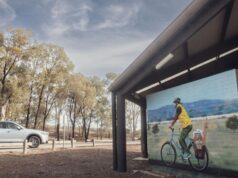A tour of William Wordsworth’s Lake District home reveals a lot about the romantic poet.
You can tell a lot about someone by spending time in their living room. Nowhere is this truer than at Rydal Mount, an elegant 16th century home near Ambleside in England’s Lake District, even if its most famous occupant has been dead for the best part of 170 years. The first thing I surmise about the life of 19th century romantic poet William Wordsworth, casting an eye across the couch where he would have spent his latter years relaxing and composing, was that he must have had a cat. It’s the scratched corner of the couch I notice, something cat owners worldwide will recognise: couch destruction writ large. Next to the couch is a faded rocking chair. Like in a painting, its emptiness is a symbol for absence.
“You can sit in it if you like,” says my host, Christopher Andrew, who just happens to be Wordsworth’s great, great, great, great grandson. “Don’t be shy. This is a home, not a museum.”
Rydal Mount was Wordsworth’s home from 1813 to 1850, when he died at age 80. I find the causal way in which this humble, historic abode has been opened up to the public wonderfully refreshing. Visitors can wander through the rooms as they please, spend time in Wordsworth’s bedroom. There are no roped off exhibits, no “DO NOT TOUCH” signs, nothing to indicate this is anything else than a normal, functioning family home.
The house dates from the 16th century, when it consisted of just one room. That room is still the soul of the house, and much like it was 500 years ago, with low ceilings and a cosy, conspiratorial atmosphere. We have Lakeland cream tea before Andrew leads us on a summer jaunt through the five acres of gardens that Wordsworth scrupulously sculptured himself.
Rydal Mount is nestled into a steep hillside, with gardens dug into the landscape and constructed with the rhythm and elegance of the finest sonnet. From the house we follow a garden path lined with beech trees, rhododendrons and rock pools. Sloping terraces span the domestic and wild divide, like stanzas linking themes. We pause at Wordsworth’s modest stone summerhouse, where Andrew treats us to a reading of Wordsworth’s poem “Lines Written in Early Spring,” which shows off Wordsworth’s perhaps revolutionary foreshadowing of environmentalism, written at a time when the industrial revolution was cloaking the country in factory smog.
Through primrose tuffs, in that green bower,
The periwinkle trailed its wreaths;
And ‘tis my faith that every flower
Enjoys the air it breathes
We hear another poem – “My Heart Leaps Up” – out on the manicured croquet lawn, with the house a stately backdrop. The poem explores the theme of childhood wonder in nature – in this case the beauty of a rainbow – and how our senses can become dull to such simple pleasures as we age. I find myself stuck on the line, “The child is father of the man,” and make a pledge to pause and view the world through the learned eyes of a child, to tap into that innocent and wondrous place we’ve all come from.
The land Rydal Mount occupies has a history that far predates its most famous tenant. Andrew leads us to the top of an ancient mound on a high point in the garden and we gaze down along a sweeping valley and over the shimmering blue grey surface Rydal Water. This is the mount from which the house gets its name. During the 11th century a beacon was lit here to warn the English of invading Scots. Today the mound is the scene of something more sedate: a reading of the Wordsworth sonnet, Composed Upon Westminster Bridge. Our tranquil perch is a far cry from the setting of the sonnet, in the hazy heart of London, but in Wordsworth’s day even the view across the Thames could invoke the rousing spirit of nature, as Andrew reads aloud:
…This city now doth, like a garment wear
The beauty of the morning; silent, bare…
The beauty of Rydal Mount has similar qualities. A chance to walk in a great poet’s muse, to be seduced by the pure essence of the natural world and see the world through his eyes, and through the wisest eyes of all, the eyes of a child.
In the know
Rydal Mount is open eleven months a year (closed in January) and private tours around the house and garden are available. Afternoon cream tea in Wordsworth’s dining room can also be booked, along with exclusive access for wedding and events.
Link to story here



